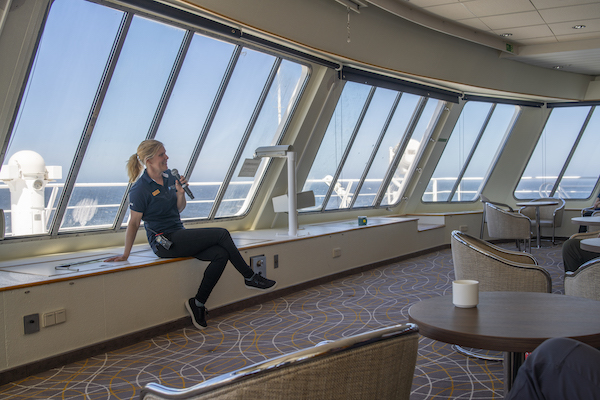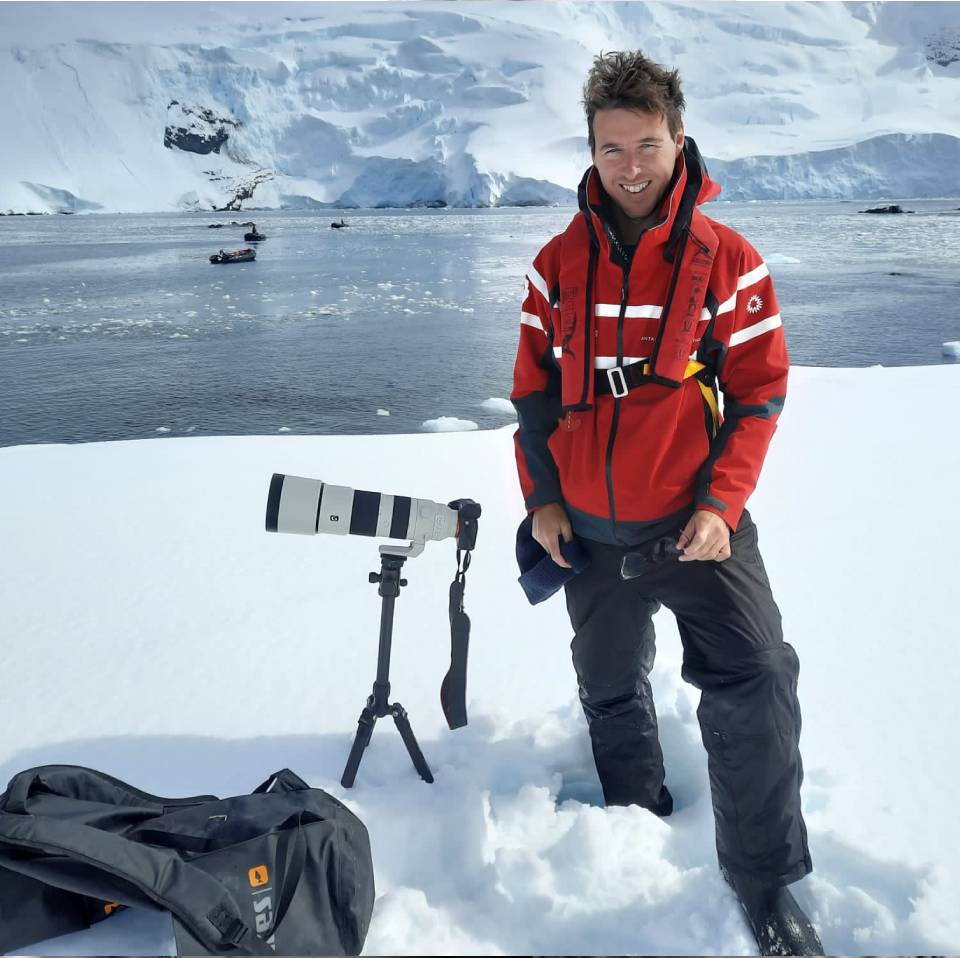Expedition cruises to Antarctica are more than just sightseeing trips; they are immersive experiences that offer profound insights into one of the most remote and pristine environments on Earth.
For me personally, the people who make these experiences come to life are the expedition teams. Their role is to not only make sure that the passengers enjoy their journey but also leave with a deep understanding and respect for the White Continent.
One of my favourite elements of an Antarctic voyage is getting to speak with the expedition team during shore landings and dinner time. Almost every guide I have met is absolutely fascinating to talk to.
Most guides have incredibly diverse backgrounds in various fields, such as science, exploration, education, and possess years of experience in extreme environments. This makes them vastly knowledgeable on Antarctica and captivating dinner companions!
As you will discover for yourself, their expertise allows them to provide in-depth knowledge and context, transforming a simple visit into an educational expedition.
For example, you might find a guide who has spent years studying penguin colonies or another who has led scientific expeditions to track the movement of glaciers. Others may be professional photographers or historians who have published works on Antarctic exploration.
This varied expertise means that every landing, every encounter with wildlife, and every scenic view is enriched with professional insight and personal anecdotes.
If you ever catch a guide in the bar then I highly recommend that you go and buy them a drink and listen to some of the stories they have to share.
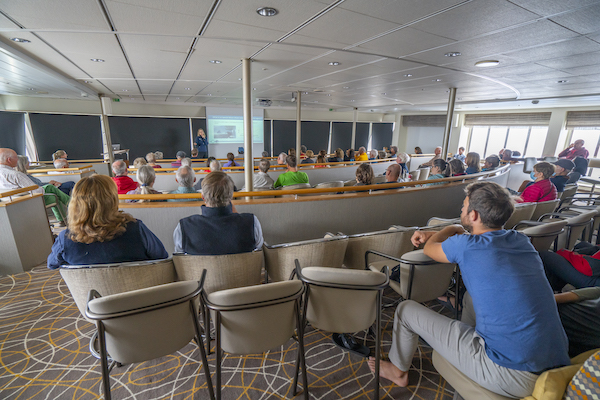
The Role of Guides: Enhancing the Experience
Expedition guides do far more than lead excursions; they are educators, safety officers, and conservation advocates.
Their responsibilities include:
- Safety: Ensuring passengers are safe during landings and while on board, especially given the unpredictable weather and challenging terrain.
- Education: Offering lectures and briefings on a range of topics, making complex scientific and historical concepts accessible to all.
- Conservation: Educating passengers on the importance of preserving Antarctica’s fragile ecosystem and enforcing IAATO (International Association of Antarctica Tour Operators) guidelines.
- Navigation: Using their knowledge of the terrain, ice conditions, and wildlife behavior to guide the ship and its passengers to the best locations for sightseeing and exploration.
Subjects of Lectures and Presentations
Lectures are a fundamental part of any Antarctic cruise. Many people ask me if the lectures are dry or even ‘boring’, but the answer is no!
Most of the lectures are absolutely fascinating for two reasons: Firstly, the topics and the way they are delivered is very interesting. Secondly, and more importantly, lectures that discuss an area that you are actually sailing through brings the whole lecture and area to life!
Expedition guides deliver these lectures and presentations and they cover a wide array of topics.
Here’s a breakdown of the key subjects:
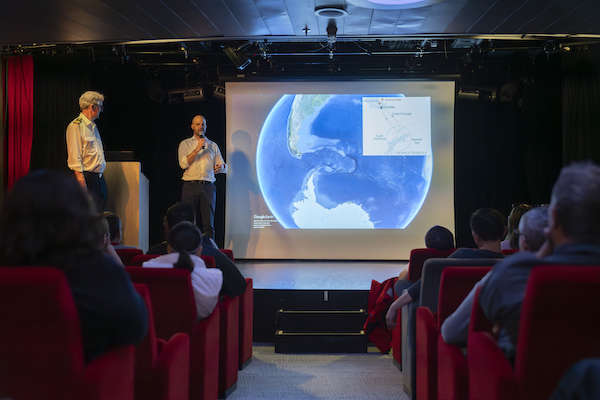
1. Geology
Antarctica’s landscape, from its towering mountains to its expansive ice sheets, tells a fascinating story of geological history. Guides with backgrounds in geology explain the formation of the continent, the significance of its rock formations, and the processes that have shaped the landscape over millions of years. Topics might include:
- The creation of the Transantarctic Mountains.
- The role of volcanic activity in shaping the continent.
- Ice dynamics and glaciation processes.
2. Photography
Antarctica’s unique light, vast landscapes, and abundant wildlife make it a paradise for photographers. Photography guides, who are often professional photographers themselves, provide tips and techniques for capturing the beauty of the continent. They cover topics such as:
- Composing shots in challenging weather conditions.
- Techniques for photographing wildlife from a distance.
- Best practices for handling cameras in extreme cold.
3. History
Antarctica has a rich history of exploration, marked by tales of bravery, endurance, and scientific discovery. Guides with expertise in history provide captivating narratives about the early explorers such as Roald Amundsen, Ernest Shackleton, and Robert Falcon Scott. Topics might include:
- The Heroic Age of Antarctic Exploration.
- The race to the South Pole.
- Modern scientific exploration and the establishment of research stations.
4. Marine Biology
The Southern Ocean surrounding Antarctica is teeming with life, from krill to colossal squid to majesticwhales. Marine biologist guides share their knowledge about the unique adaptations of Antarctic marine species, the importance of krill to the ecosystem, and the impact of climate change on marine life. Key topics include:
- The life cycle and migration patterns of whales.
- The role of krill in the Antarctic food web.
- The impact of sea ice changes on marine biodiversity.
5. Climate Change
Antarctica is at the frontline of global climate change, with its ice sheets and ecosystems highly sensitive to warming temperatures. Climate scientists and environmental specialists on board discuss:
- The impact of melting ice sheets on global sea levels.
- The role of Antarctica in regulating global climate patterns.
- The latest research findings on the effects of climate change on Antarctic ecosystems.
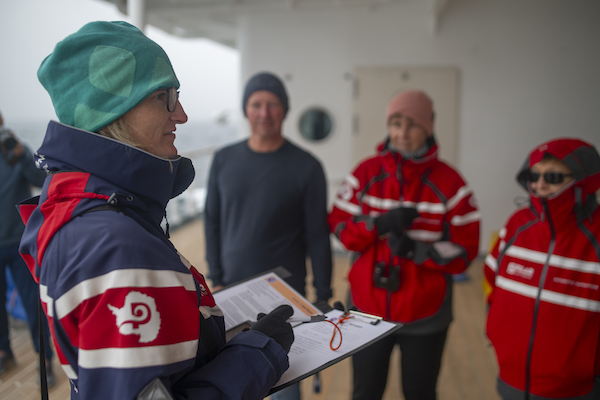
The Role of Expedition Guides in Conservation
Beyond their roles as educators and leaders, expedition guides are also advocates for conservation. They ensure that all activities comply with strict environmental guidelines to protect the pristine Antarctic environment. This includes:
- Enforcing strict biosecurity measures to prevent the introduction of non-native species.
- Educating passengers on minimizing their environmental impact.
- Participating in scientific data collection, such as wildlife surveys or microplastic sampling.
- Enforcing IAATO guidelines during shore landings.
Conclusion: More Than Just Guides
Expedition guides in Antarctica are far more than just tour leaders; they are stewards of the environment, passionate educators, and experts in their fields.
Some of my favourite memories of my Antarctic trips are speaking to guides, hearing about their background and learning more from them than any book could ever give me.
Their knowledge and dedication ensure that visitors not only enjoy their Antarctic adventure but also gain a deeper understanding of this incredible region and the importance of its preservation.

